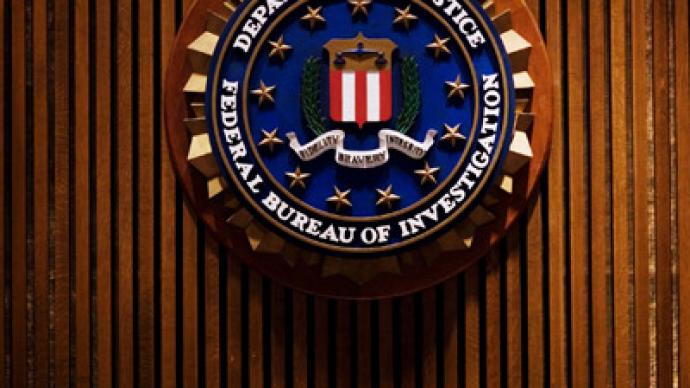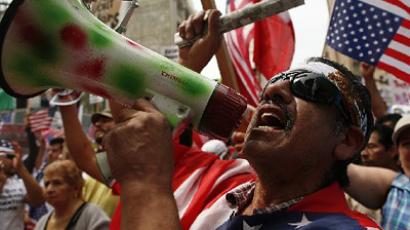FBI releases documents that confirm they spy on anarchists

Two anarchists remain locked up as prosecutors attempt to coerce the testimonies they’ve been subpoenaed to give about acts of vandalism in the Pacific Northwest. In the meantime, though, the FBI has accidentally blown the cover off its own case.
Ever since Leah Plante, Katherine “KteeO” Olejnik and Matt Duran were asked to testify before a federal grand jury earlier this year, all three self-identified anarchists have been adamant about remaining silent. For refusing to speak, federal prosecutors have since put the trio of twenty-something activists behind bars over contempt of court charges, with Plante being awarded her freedom only in recent days. As her colleagues continue their imprisonment, though — where they could remain for the entirety of the 18-month investigation — the FBI has failed to provide to the press or public alike any information as to why they’ve targeted the known activists or what role they could play in unraveling a greater conspiracy. On Thursday, legal documents intended to be cloaked indefinitely were accidently unsealed in US District Court in Seattle for a moment, finally offering a small bit of insight as to why the FBI has been targeting adherents to a specific ideology and intensifying what some have equated to a politically-motivated witch-hunt aimed at anarchists.The Seattle Times reports that an affidavit dated October 3 was momentarily made available during last week’s court proceedings, revealing to those in attendance that the investigation into Plante and her peers dates back to earlier this year when the FBI first began spying on a group of suspected anarchists they believed were conspiring to commit acts of violence and destruction. Beginning as early as April 9, the FBI was conducted surveillance on alleged anarchists from Portland whom soon after planned to travel to Seattle to participate in the city’s May 1, 2012 day of action activities held in coordination with other locales across the country. The feds followed a group of six suspects across state lines from Portland, Oregon into Olympia, Washington in the days before the May Day activities and drafted an indictment that could eventually lead them to charge the group with conspiracy, destruction of government property and interstate travel with intent to riot, according to the 34-page document viewed by the Times. So far, though, none of the six suspects have been formally charged with any crimes."Although many anarchists are law abiding, there is a history in the Pacific Northwest of some anarchists participating in property destruction and other criminal activity in support of their philosophy," the affidavit reads, according to the newspaper.That’s where the Pacific Northwest Three fit in: investigators had hoped that by subpoenaing Plante, Olejnik and Duran to testify, they’d learn more about anarchists in the region who may have been vocal about any attempts to wreak havoc during the May Day protests.According to the search warrant unsealed this week, the government claims that tens of thousands of dollars in damages resulted from the May 1 actions in Seattle, largely due to attacks on the William Kenzo Nakamura U.S. Courthouse and a few private businesses in the vicinity. Video footage obtained from the scene has been endlessly analyzed by FBI detectives who have in the weeks and months since tried to build a case to file charges against the suspects, none of whom are reported to include the three persons asked to testify. That investigation has led to filing not just subpoenas against the Pacific Northwest Three, but executing no fewer than five search warrants in July that aimed to recover cell phones, computers, clothing and literature from Plante, her peers and others believed to be in cahoots with any local anarchists.In addition to being met with silence from the Northwest Three, the trove of “evidence” uncovered by the authorities has so far left them unable to release an indictment targeting their suspects. Instead, they have been left with cell phones that, according to the unsealed affidavit, contain text messages describing the May Day protest as “awesome” but nothing more remotely noteworthy, or at least not enough to file charges.While Plante has since been freed from prison where she was held in solitary confinement for refusing to comply with the grand jury, both Olejnik and Duran remain behind bars as investigators wait to see if they’ll be willing to speak."What (prosecutors) decided to do is choose people and punish them for their association," Jenn Kaplan, an attorney for Olejnik, tells the Seattle Times. To the paper, a counsel for Olejnik adds that the grand jury investigation specifically sought answers from the anarchist about someone she knows.Before being imprisoned and released, Plante said that a Freedom of Information Act request she filed revealed that the grand jury was first convened in March, two months before the vandalism she is being questioned about even occurred. Before being held in contempt of court, Plante wrote, “The government wants to use [grand juries] to collect information that it can use in a campaign of repression. I refuse to have any part of it, I will never answer their questions, I will never speak.”An attorney for Duran adds that while their client isn’t being suspected or accused of the May 1 vandalism in Seattle, the associations that exist within the community are enough to keep him under the FBI’s radar. The intended result, many fear, is a chilling effect on a community of likeminded individuals that could soon enshroud other groups of activists and outspoken youths."One of our concerns was they were really targeting him because they perceived him to be associated with the anarchist community," Gordon says. "It's kind of a fishing expedition."














